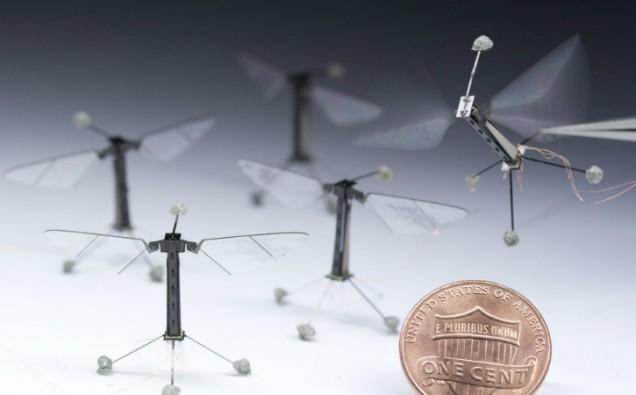The world’s largest science conference was host to a groundbreaking announcement by one of the world’s leading technology experts. A leading expert in the tech field has revealed a fleet of robobees, could be deployed in the future if the natural populations of the buzzing insects continue to decline at a current alarming rate.
Japanese scientists have developed a remotely controlled drone the size of a dragonfly which was able to pollinate lilies.US scientists have also joined the technology race developing a robobee about half the size and ability to flap 120 times a second.
Prof Shashi Shekhar is one of the world’s leading experts in state-of-the-art mapping and said robotic swarms could be the answer to catastrophic food shortages.Prof Shekhar mused that he expects US funding for the robobee project to be permitted within the next two years. He outlined the necessity of such research and hopes for future innovations using similar faceted technology.
“There are efforts going on to understand why bee colonies are collapsing,” he said.
“This is a back-up plan. With climate drying, if you look at areas like California and the west you are losing lots of trees. If you lose the tress that’s the beginning. The next things are probably insects or birds or animals so it’s good to have some insurance.”
The Japanese prototype has been developed by the National Institute of Advanced Industrial Science and Technology in Tokyo. They fly using a helicopter-style propeller and used gel applied to horsehair pads to mimic their fuzzy body which helps pollen stick. Researchers now plan to create a smaller, bee-sized drone that would use the same technology to carry pollen grains but could fly autonomously.
US researchers at Harvard University had already developed a bee-sized drone weighing less than a gram that has wings that flap similar to the real thing. Computer science expert Prof Shekhar said Geographic Information Systems (GIS) have now been developed using aerial scans to provide detailed field maps. Incredibly detailed maps are now used in agriculture and with drones flying over crop fields able to scan and count individual leaves and flowers.
Prof Shekhar, from the University of Minnesota, said: “The big gap when you think about what was missing is you have to have some kind of a map of the flowers.”
“If you made a very detailed map, then offline using these images you could create the location of the plants and the flowers.
“Today these technologies are mature enough that this could be done daily. Then all of this computing and sensing is offloaded from the bee.
“Then offline you can choose the route. Suppose you have a fleet of 10 bees or 100 bees or 1,000 bees, then you can divide up the work.
“You can say to bee number one go to these 10 flowers.
“It’s just like when you look at delivery services like UPS or the Post Office they have to deliver all the letters and pick up all the letters, but it’s all pre-programmed.
“Every vehicle knows exactly the route and the stops for pick up and drop off. Imagine a similar thing for the bees.”
He told the annual meeting of the American Association for the Advancement of Science this had been made possible by developments in technologies such as LIDAR scanning.
This can assess depth and mass from above and combined with detailed aerial images.
But Prof Shekhar warned fleets of robobees could be hacked or developed by militaries to carry chemical “stings” as a weapon to attack humans.
He added: “There is a food security problem being looked at in the US because of climate change.
“It’s conceivable that from the security perspective some Government labs are trying to create a small group [of bees] in case the commercial sector is not there yet.
“There are things which are classified. I don’t have security clearance to know for sure but there are things they do prepare for.”
























